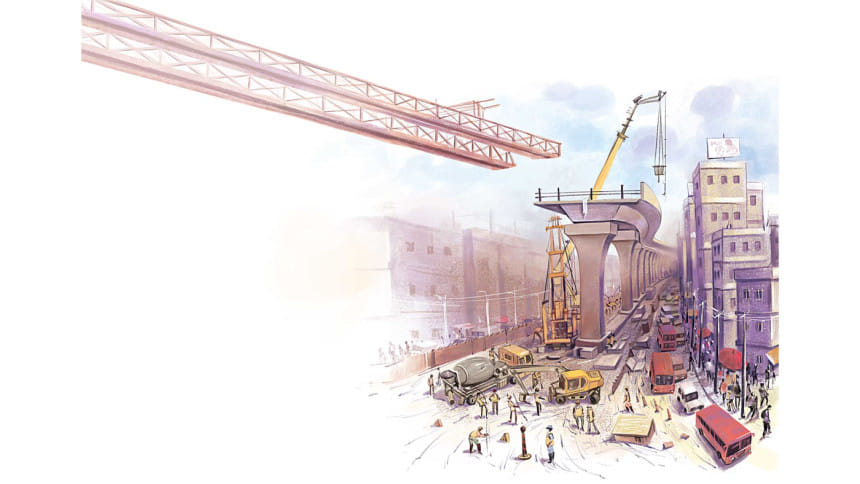How many revisions does a development project need?

Despite the higher authorities' public expression of dissatisfaction with frequent revisions of government projects, the practice of taking projects to ECNEC meetings to be granted deadline extensions, design changes, expansion of scope and budget enhancements has continued unabated. In most cases, the underlying factors that warrant project revisions are slow implementation and cost escalation. While sometimes there are genuine reasons for such revisions—such as the rise in market prices of construction materials and, recently, impacts of the Covid-19 pandemic on project implementation—the reasons given to justify deadline extension and cost escalation are often difficulties in procurement, challenge of land acquisition, delay in release of imported goods from the ports and late recruitment of project staff and consultants. In essence, there are design-level weaknesses, unrealistic budget estimations, followed by delays in floating of tenders and completing procurement formalities.
The total amount of ADP proposed in the current fiscal year's (2021-22) budget is Tk 225,324 crore, which is 6.5 percent of the GDP. As many as 1,426 projects are included in this year's ADP. About 25 percent of these projects have been revised one to three times already. Frequent revisions of development projects are discouraged in the government's guidelines, which do not allow revision of a project more than twice. A third revision is possible but only with prior approval of the planning minister.
The ADP guidelines allow project revisions only in cases where a) planned objectives of a project are not achievable and have to be changed, b) costs have increased due to currency fluctuations, c) CD/VAT charges have increased, d) national pay scale and other allowances have increased, e) costs of physical items have changed, f) the project design needs changes, and g) the project needs additional resources. The implementing ministry of a project has the approval authority of a revision costing up to 10 percent of the total budget. If the project costs require a 25 percent increase or decrease, the planning minister has the authority to approve the change within a limit of Tk 50 crore. Revisions of high-value projects are placed before the ECNEC for approval.
Making requests for extension of a project's tenure and its costs is a regular practice in the country, however. The huge time and cost overruns of many projects are encouraging a culture of seeking revisions since there are a number of grounds given in the ADP guidelines for revisions. In January 2022, 10 projects were placed before the ECNEC for revision whose original costs were around Tk 3,099 crore. The estimated cost escalation requested for approval of these projects totalled about five times more at Tk 14,961 crore. During the first eight months of the current fiscal year, the additional project costs approved by the government, according to The Daily Star, amounted to a staggering Tk 59,919 crore, which can potentially fund two megaprojects like the Padma Bridge.
This is a huge amount of project budget escalation and, therefore, requires a closer look at the way project plans are drawn up, reasons for increase of project costs and the appropriate steps needed for timely completion of projects.
No doubt the government urgently needs to address the challenge of frequent project budget revisions. The first step here is to realistically plan and build sound implementation modalities into project proposals. Proper planning and projection of project activities and associated funding requirements should be carefully drawn up in project proposals.
The volume of public investment is rising every year in Bangladesh due to the increased demand for infrastructure and services. The government needs to undertake more projects but, at the same time, exercise more scrutiny and caution in its selection process and only fund projects that are essential. Ministries should be strict in their screening and appraisal of projects, and monitor their implementation so that so many undertakings do not require revisions every year.
Improvement in the entire project cycle is necessary in order to minimise the phenomena of project revisions. From the feasibility study phase to the development of a project proposal, from the approval of a project to its implementation, supervision and monitoring, everything should be streamlined so that improvement is visible and tangible. Inadequate monitoring and supervision of field activities to ensure quality implementation is also lacking. The government needs to address all the bottlenecks faced and maximise projects' outputs. Boosting the capacity of public-sector projects will help raise employment opportunities, create effective demand in the short term and enhance social impact in the long run. Improvement of the quality of project performance is essential to enhance ADP implementation which contributes to increased rate of GDP growth.
Dr Nawshad Ahmed, a former UN official, is an economist and urban planner.

 For all latest news, follow The Daily Star's Google News channel.
For all latest news, follow The Daily Star's Google News channel. 



Comments